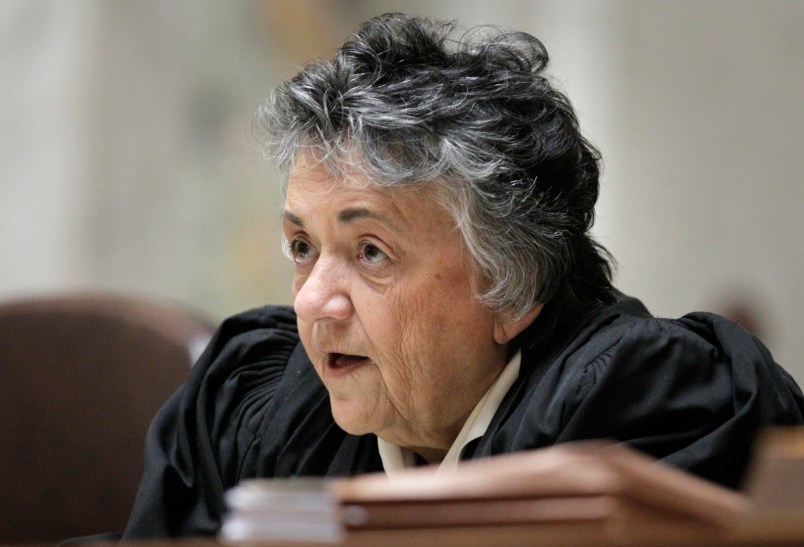Wisconsin’s Republican-led legislature is pushing through a constitutional amendment that in-state observers say is a thinly veiled attack on the current liberal Wisconsin Supreme Court chief justice.
The amendment, which cleared the Senate on party lines Tuesday, would change how the court’s chief justice is chosen. The position would no longer be the most senior judge on the court — which is currently Shirley Abrahamson, a liberal — and instead the chief justice would be elected by the other members of the court.
Four conservatives and three liberals, including Abrahamson, are sitting at the bench now. That leaves little doubt that, if the amendment were to be adopted, Abrahamson would be ousted.
“I think everyone understands that if this passes, she’s not the chief. She won’t have a majority,” Chad Oldfather, a law professor at Marquette University, told TPM on Tuesday. “She has been understood to be a consistently liberal justice, and the way the politics of this state are right now, they’ve become increasingly hardball in nature. This sort of move is consistent with that.”
Republican lawmakers have refused to characterize the amendment, which goes next to the House and then would be put in front of state voters for final approval in an April special election, as politically motivated. They have instead hung onto the fact that 20-some other states already allow the court to elect its chief justice.
“This is not about the current chief justice,” state Sen. Tom Tiffany (R), the amendment’s sponsor, said. “I believe this is the most appropriate way for our chief justice to be named.”
The practical effect might be negligible — the Wisconsin chief justice, like her federal counterpart, has some additional administrative duties, a senior privilege to author opinions and the prestige of the position — and the balance of the court between liberal and conservative justices and the outcomes of cases before the court would not be directly affected. However, the political message would be clear.
“The legislators proposing this don’t seem to be openly acknowledging as much,” Oldfather said, “but I think it’s fairly well understood that they’re at least not troubled by the fact that they would unseat as chief justice someone who they probably view as an ideological foe.”
There doesn’t seem to be one particular thing about Abrahamson, who was elected to the court in 1976 and took over as chief justice in 1996, that has set off the amendment push. But the court has developed a reputation as being particularly acrimonious during Republican Gov. Scott Walker’s tenure, including litigation over the anti-union law that led to a 2012 recall election and continuing through to the court’s December decision to hear challenges to the John Doe investigation that has plagued Walker.
Perhaps most famously, a liberal justice accused a conservative colleague in 2011 of putting her in a chokehold during an argument in her chambers with other justices present. And that same year, one of Abrahamson’s conservative colleagues admitted calling her “a total bitch.”
Abrahamson has apparently rankled some of her colleagues for a while. During her 1999 re-election campaign, conservative members of the court publicly endorsed her challenger, according to a Chicago Tribune report accessed via Nexis.
“A lot of partisanship has been associated with the court and elections to the court,” Oldfather said. “I don’t think it’s been one specific thing. She’s just been around long enough.”
That partisanship has now seeped into the debate over the amendment. Democratic members of the Senate committee that considered the amendment walked out during a hearing. A challenger to one of the court’s liberal justices has endorsed it. That justice, Ann Walsh Bradley, meanwhile has criticized the measure for politicizing the court.
“The state constitution should not be used for political scores,” Bradley said in an interview with WISN.







Seig Heil to Fuehrer Walker.
‘Increasingly hardball’. Euphemism of the day.
The government of the State of Wisconsin has been overthrown by an invisible palace coup. It’s long past time that the voters stop sending crazy Republicans to run their legislature, while the Goggle-Eyed Homunculus sells off the state’s resources to the highest bidder. Robert Lafollette is spinning rapidly in his grave, crying softly to himself. When will be rid of these criminals??
Yep. It means “government in the hands of a nihilistic authoritarian movement party that openly sneers at the rule of law once it gains power.”
Read this article. It’s full of Liberal / Conservative crap. That’s the problem. Not whether a Liberal or a Conservative sits at the top of the court but that we now acknowledge political ideology is what’s driving these Justices. And that that is OK now.